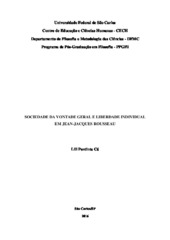| dc.contributor.author | Cá, Lili Pontinta | |
| dc.date.accessioned | 2016-09-27T19:51:28Z | |
| dc.date.available | 2016-09-27T19:51:28Z | |
| dc.date.issued | 2016-02-24 | |
| dc.identifier.citation | CÁ, Lili Pontinta. Sociedade da vontade geral e liberdade individual em Jean-Jacques Rousseau. 2016. Dissertação (Mestrado em Filosofia) – Universidade Federal de São Carlos, São Carlos, 2016. Disponível em: https://repositorio.ufscar.br/handle/ufscar/7527. | * |
| dc.identifier.uri | https://repositorio.ufscar.br/handle/ufscar/7527 | |
| dc.description.abstract | In Of the Social Contract, Rousseau says that in the civil state the man enjoys individual freedom at the same time as a member of the social body, whose general will is the driving force of the State. That is, the philosopher shows that, on the other hand, the general will, founded through the metaphor of the social body united for the common good of the members, is sovereign to drive life in society and, on the other, the man is to be free in that, as a member of that body, rules your life through laws that he erects on himself, because to be truly master of himself is nothing but to listen the voice of duty or consults the reason, rather than the physical impulse that drives human life in the state of nature. Therefore, according to Gérard Lebrun, Rousseau’s social pact confines the man in the public good, denying him individual freedom. Our research consists to examine as is possible to think the general will and individual freedom in society, aiming to refute the criticism of Lebrun. | eng |
| dc.description.sponsorship | Coordenação de Aperfeiçoamento de Pessoal de Nível Superior (CAPES) | por |
| dc.language.iso | por | por |
| dc.publisher | Universidade Federal de São Carlos | por |
| dc.rights.uri | Acesso aberto | por |
| dc.subject | Rousseau | por |
| dc.subject | Estado civil | por |
| dc.subject | Liberdade | por |
| dc.subject | Vontade geral | por |
| dc.subject | Lebrun | por |
| dc.subject | Rousseau | eng |
| dc.subject | Freedom | eng |
| dc.subject | General will | eng |
| dc.subject | Civil state | eng |
| dc.subject | Lebrun | eng |
| dc.title | Sociedade da vontade geral e liberdade individual em Jean-Jacques Rousseau | por |
| dc.type | Dissertação | por |
| dc.contributor.advisor1 | Lopes, Marisa da Silva | |
| dc.contributor.advisor1Lattes | http://lattes.cnpq.br/5427042421727621 | por |
| dc.description.resumo | Em Do Contrato social, Rousseau diz que no estado civil o homem goza de liberdade individual ao mesmo tempo em que é membro do corpo social, cuja vontade geral é a força motriz do Estado. Isto é, o filósofo mostra que, de um lado, a vontade geral, fundamentada através da metáfora do corpo social unido em prol do bem comum dos associados, é soberana para dirigir a vida em sociedade e, de outro, o homem é um ser livre na medida em que, como integrante desse corpo, rege sua vida por meio de leis que ele mesmo erige sobre si, porquanto ser verdadeiramente senhor de si nada é senão ouvir a voz do dever ou consultar a razão, ao invés do impulso físico que dirige a vida humana no estado de natureza. Entretanto, para Gérard Lebrun, o pacto social de Rousseau confinaria o homem no bem público, negando-lhe a liberdade individual.
Nossa pesquisa consiste em analisar como é possível pensar a vontade geral e a liberdade individual na sociedade, visando refutar a crítica de Lebrun. | por |
| dc.publisher.initials | UFSCar | por |
| dc.publisher.program | Programa de Pós-Graduação em Filosofia - PPGFil | por |
| dc.subject.cnpq | CIENCIAS HUMANAS::EDUCACAO | por |
| dc.ufscar.embargo | Online | por |
| dc.publisher.address | Câmpus São Carlos | por |
| dc.contributor.authorlattes | http://lattes.cnpq.br/4685256168852071 | por |
